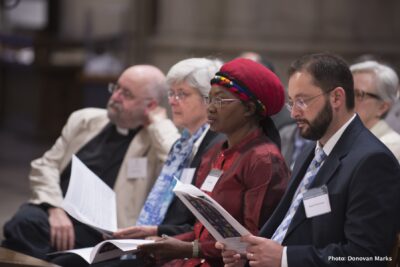We were asked by the Vatican II AAR group to inform you about their papers in this year, which we do gladly.
Rediscovering Synodality in a World Church
The Second Vatican Council marks the recovery of an understanding of the church as a communion of diverse local churches, including the values of collegial governance and the co-responsibility of all the baptized faithful. The tensions of maintaining diversity in communion are felt more acutely today, with the expansion of Christian populations in the global south. Pope Francis sees the practice of synodality as an indispensable path for discernment and church governance in the 21st century. The Synod for the church in Amazonia and the 2022 international synod of bishops are emblematic of his vision for the pastoral and missionary conversion of the church. We invite contributions on the significance of synodality, including Vatican II’s attention to the practice of synodal governance in the early church, Catholic ecumenical learning, the processes of inculturation and indigenization, and the increasing importance of the voice of the poor for ecclesial life and mission.
One Human Family
Vatican II marked a turn of the Catholic Church to dialogical engagement with other Christians, non-Christians, non-believers, and to the broader world of science and culture (UR, NA, DH, GS). These themes of constructive engagement and collaboration with all people of good will in a religiously plural society are now carried forward in Pope Francis’ encyclical, Fratelli Tutti, in a vision of solidarity and social friendship intended to inspire the building of a more just and sustainable world. He argues that despite the darkness of our time, another world is possible – an open world where all are created for a universal self-transcending love of others, especially the poor – wagering that such a spirituality will transcend the boundaries of Christianity and be harnessed to put an end to poverty, conflict, and violence. Contributions are invited on the reception of this vision into Catholic ecclesial life and its potential reception by other religious and secular communities.
In 1971 Gustavo Gutiérrez published the article “Hacia Una Teología de la Liberación”, followed by one of the most influential books of the 20th century, Teología de la Liberación: Perspectivas. To mark this year of celebrations, reflections, and conversations on this important anniversary we invite proposals that creatively engage Gutiérrez’s work from a variety of interdisciplinary lenses and contexts. We especially invite proposals that bring Gutiérrez’s contributions in contact with current challenges and future visions of the liberation of theology and theologies that seek to liberate, including problematizing the meaning(s) and praxis of liberation across the theological disciplines. (co-sponsored roundtable by Black Theology Unit, and Class, Religion, and Theology Unit, and Latina/o Religion, Culture, and Society Unit, and Liberation Theologies Unit, and Religion and Economy Unit, Religions in the Latina/o Americas Unit, Catholic Studies Unit, Vatican II Studies Unit)
Mission Statement:
This Unit gives scholarly attention to the Second Vatican Council (1962–1965), one of the most significant events in the history of the Catholic Church — an event that had wide-ranging implications for other faiths, other Christian churches, and for the wider world alike. This Unit has a double focus: first, deepening the understanding of the history of Vatican II, its link with movements of renewal in Catholic theology and in the Church in the decades prior to Vatican II, and the history of the reception of the Council, and the redaction history of the different documents of the Council; second, a strong theological on both to the hermeneutical issues connected to methods of interpreting conciliar teaching and its ongoing reception in a changing context. By looking more closely at the past, our Unit hopes to promote greater conciliarity and synodality in the Christian churches in the present. In this second mandate of its presence within the American Academy of Religion (2018-2022) the Vatican II Studies Unit turns its attention to the reception of Vatican II within the various social and cultural contexts of the Americas and elsewhere, and to its continuing influence in the changing context of twenty-first century global Christianity.
Method of Submission:
https://aar-conference.imis-inspire.com/a/
For detailed instructions: https://cdn.filestackcontent.com/8hrBYfDQQUOkEyxBwomX?2021-AAR-Call-for-Proposals.pdf

